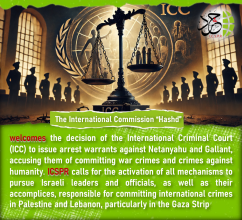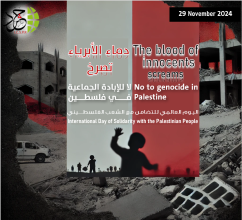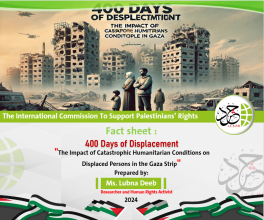
During its conference, ICSPR reviews the results of monitoring the elections and the requirements for their success
Date :16 Mar 2021
Press release
During its conference, ICSPR reviews the results of monitoring the elections and the requirements for their success
Occupied Palestine / Gaza: The International Commission to Support Palestinians’ Rights (ICSPR) held a press conference today ” 14 March 2021″ to present a preliminary report on: “The results of monitoring the course of the elections and the requirements for their success,” at its headquarters in Gaza City.
The report, which was delivered by lawyer Salah Abdel-Ati “Chairman of ICSPR”, reviewed the preliminary results of election monitoring, which are represented in the violations of the occupation since the issuance of the presidential decree on holding the general elections on 15 January 2021, where the occupation authorities launched a summons campaign and the threat of imprisonment for many MPs and Palestinian leaders and activists in the West Bank if they run for any upcoming elections, the occupation authorities also arrested the deputy, Jihad Abu Zunaid, head of the Women’s Center in Shuafat Camp, north-east of occupied Jerusalem, in addition to sentencing MP Khaleda Jarrar to 20 months in administrative detention, the continuation of arresting Deputy Ahmed Saadat, ”Marwan Barghouti, and forbidding the elections to take place in East Jerusalem.
On the other hand, internal challenges and violations were monitored, where since the issuance of the election decree, the Central Elections Committee initiated its preparatory work, during which the Palestinian President issued a number of decrees that clearly affected the independence of the judiciary, in violation of the provisions of the Basic Law, and the decree of Law No. 07 of 2021 amending the Law of Charitable Associations and Civil Organizations No. 01 of 2000, which is considered a blatant assault and unconstitutional and illegal interference in the work of these civil societies and institutions.
These internal violations were exemplified in the election law and the amendments made by President Mahmoud Abbas to the law, which carried multiple restrictions on the candidacy process, including resignation and its acceptance, judgments, list fees, insurance, women’s quotas, the age of candidacy, and ambiguities about “president of state or head of authority”, where he replaced the phrase head of the National Authority with president of the state of Palestine, as the election of the President of the State of Palestine, who is the President of the Liberation Organization, is fundamentally different from the election of the head of the Palestinian Authority, which is confined to the West Bank, including Jerusalem and the Gaza Strip.
The report stated that the election court was formed according to a presidential decree issued on 1 March 2021, and based on the placement of the Supreme Judicial Council headed by Judge Issa Abu Sharar, and only in consultation with the Hamas movement on the names of the judges and without the comprehensive national consensus stipulated by the Cairo dialogue, which would keep the court under the jurisdiction of the Judicial Council in the West Bank.
The report also monitored many indicators that clearly indicate that the Palestinian Executive Authority, headed by President Mahmoud Abbas, is pursuing policies that are not commensurate with electoral justice, and aims to engineer the electoral process by obstructing the right of some citizens to run, whether through restrictions on candidacy and exclusionary conditions for candidates, and also the threats by President Mahmoud Abbas and other political leaders close to him, to anyone who dares to run outside the lists of the Fatah movement, such as the stinging attack on prisoners who wish to run for themselves, especially on the captive leader Marwan Barghouti as well as on everyone who seeks to form an independent list, such as Mr. Nasser Al-Qidra.
During its report, ICSPR called for the necessity of holding the Palestinian elections on the date specified by the presidential decree, creating the atmosphere to conduct the Palestinian presidential, legislative and national elections, fortifying the elections, ensuring the participation of a wider range of Palestinian sectors in these elections, and neutralizing and freezing the work of the Constitutional Court, clearly stipulating the end of the term of the presidency and the Legislative Council four years after the elections, and stipulating that if a member of the Legislative Council is arrested for a long period, a new member will be chosen from the same bloc to which he belongs, according to the sequence of names.
Concerning the elections of the National Council, ICSPR called for the amendment of the electoral system for the National Council that was established by the National Council in 1964, and agreeing to separate the organization from the authority, and to ensure that elections are held in unions and popular organizations, and in the Palestinian communities abroad to ensure their representation in the National Council, and the establishment of an independent body in which the people abroad and their representatives participate effectively.
It also called for agreeing on a national charter to respect the holding of the elections in succession and on time and to ensure that their results are respected, and to ensure the existence of an effective monitoring body (Arab and international), in addition to the Central Elections Committee and Palestinian civil society institutions, that takes upon itself to extensively oversight the entire electoral process, and makes the elections an opportunity to renew the leadership structures and end the division.
By the end of the report, ICSPR urged the Palestinian leaders to shoulder their responsibilities by taking meaningful measures to ensure the re-emission of Palestinian energies and capabilities to face national and humanitarian challenges and dangers.
It also called on the leadership and all Palestinian forces to heed the people’s appeal, and not to take any step that strengthens the division, warning of the danger of lack of national agreement, or failure to provide guarantees that the elections will be held in a democratic and fair manner.





